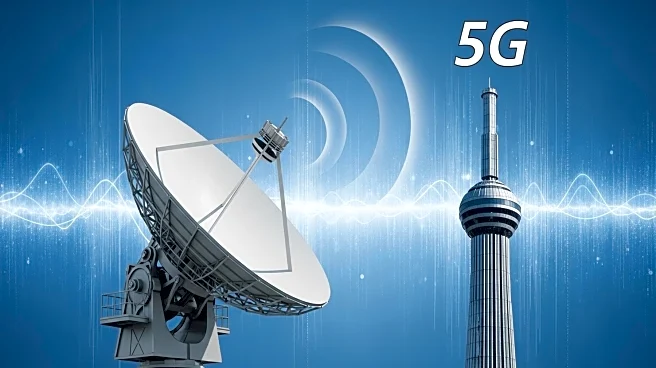What's Happening?
EchoStar, a satellite communications company based in Colorado, has announced the sale of its spectrum licenses to AT&T in a significant all-cash transaction valued at $23 billion. This deal is set to close by mid-next year and will provide AT&T with 30 MHz of mid-band spectrum and 20 MHz of low-band spectrum, enhancing its U.S. network capabilities. The acquisition is part of AT&T's strategy to meet the increasing demand for 5G connectivity, driven by emerging technologies such as AI-native devices, autonomous vehicles, and advanced robotics. EchoStar has faced criticism from the FCC and SpaceX for underutilizing its spectrum licenses, failing to meet deployment requirements for a nationwide 5G network. The agreement allows EchoStar to shift its focus, enabling its Boost Mobile brand to operate as a hybrid mobile network operator using AT&T's network. Additionally, EchoStar plans to invest in a direct-to-device constellation, ordering a $1.3 billion 100-satellite constellation from MDA Space.
Why It's Important?
The sale of spectrum licenses to AT&T marks a pivotal moment in the competitive landscape of U.S. telecommunications. By acquiring these licenses, AT&T can significantly expand its 5G network, potentially leading to improved connectivity and technological advancements across various sectors. This move positions AT&T to better compete with rivals like T-Mobile and Starlink, who are also vying for spectrum resources to enhance their network offerings. For EchoStar, the deal provides a substantial cash influx, allowing it to pivot towards developing direct-to-device capabilities, which could redefine its business model and market presence. The transaction also alleviates regulatory pressures from the FCC, enabling EchoStar to explore new strategic directions.
What's Next?
As the deal progresses towards completion, AT&T is expected to integrate the newly acquired spectrum into its network infrastructure, aiming to deploy the mid-band licenses promptly. This expansion could lead to increased competition among major telecom players, each striving to offer superior 5G services. EchoStar's investment in a direct-to-device constellation suggests a strategic shift that may influence future market dynamics. Stakeholders, including regulatory bodies and competitors, will likely monitor these developments closely, assessing their impact on the telecommunications industry and consumer connectivity.
Beyond the Headlines
The transaction highlights broader implications for the telecommunications sector, particularly in terms of spectrum management and regulatory compliance. EchoStar's decision to sell its spectrum licenses reflects the challenges companies face in meeting deployment requirements and optimizing resource utilization. The deal also underscores the growing importance of direct-to-device technology, which could transform how connectivity is delivered and consumed. As companies navigate these shifts, ethical considerations around spectrum allocation and usage may come to the forefront, influencing policy discussions and industry standards.









